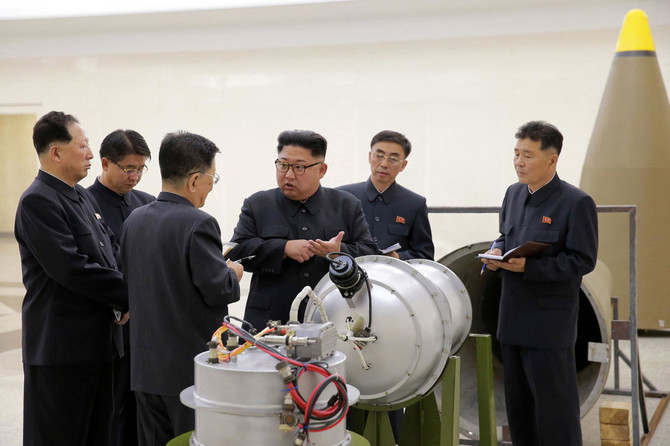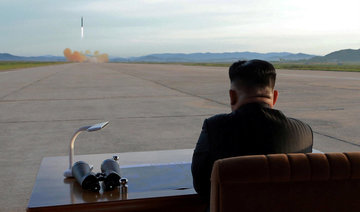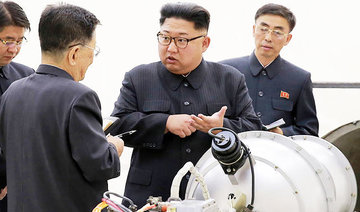SEOUL: North Korea said Saturday it was seeking military “equilibrium” with the United States as leader Kim Jong-Un vowed to complete Pyongyang’s nuclear program, which he said had “nearly reached the terminal.”
North Korea successfully fired a Hwasong-12 intermediate-range ballistic missile over Japan on Friday, responding to a new round of UN sanctions over its sixth nuclear test with its furthest-ever missile flight.
“Our final goal is to establish the equilibrium of real force with the US and make the US rulers dare not talk about military option for the DPRK,” leader Kim said, according to a report carried by the official KCNA news agency.
Kim said the country was close to the goal of completing its nuclear ambitions and should use all power at its disposal to finish the task, saying it had “nearly reached the terminal,” the official KCNA news agency reported.
Kim said Friday’s launch, which it described as a drill rather than a test, had increased the North’s “combat power of the nuclear force,” KCNA reported.
“We should clearly show the big power chauvinists how our state attain the goal of completing its nuclear force despite their limitless sanctions and blockade,” Kim said, according to KCNA.
The UN Security Council condemned Friday’s launch as “highly provocative” and US President Donald Trump scheduled talks with the leaders of Japan and South Korea to address the crisis.
The US Pacific Command confirmed Friday’s rocket was an intermediate range ballistic missile (IRBM) and said it did not pose a threat to North America or to the US Pacific territory of Guam, which Pyongyang has threatened with “enveloping fire.”
Seoul’s defense ministry said it probably traveled around 3,700 kilometers (2,300 miles) and reached a maximum altitude of 770 kilometers.
Yang Uk, an analyst with the Korea Defense and Security Forum, told AFP that Kim’s stated ambition of achieving a military balance was some way off.
“It’s too unrealistic for North Korea to reach equilibrium in nuclear force with the US,” he said.
The North has raised global tensions with its rapid progress in weapons technology under Kim, who is regularly pictured by state media overseeing launches and visiting facilities.
“The latest launch, which was apparently made from a TEL (transporter erector launcher or missile vehicle) instead of a makeshift launch pad, means the North is now ready to deploy the IRBM Hwasong-12 for combat purposes,” he said.
North Korea’s official party newspaper Rodong Sinmun allocated half its coverage to publishing pictures of the launch, showing the missile being launched from TEL.
“The North appears to have resolved technical difficulties in launching the missiles from TELs. With its mobility being increased, Hwasong-12 poses an imminent threat to the US and its allies in the region,” he said.
The North’s previous missile launch, a Hwasong-12 IRBM just over two weeks ago, also overflew Japan’s main islands and was the first to do so for years.
“Within three to five years, the North is expected to be capable of operating nuclear missiles as deterrence,” Yang Uk added.
Russian President Vladimir Putin and his French counterpart Emmanuel Macron jointly appealed for talks with North Korea, saying this was the only way to resolve tensions over its nuclear program.
The appeal was directed at the United States and Japan, countries calling to ramp up pressure through sanctions rather than pin hopes on talks.
Russia and China, North Korea’s main ally, on Monday backed a US-drafted resolution at the Security Council to impose fresh sanctions on Pyongyang — but they maintain dialogue is key to defuse the crisis.
The sanctions imposed on Monday banned the North’s textile trade, stopped new work permits for its laborers, and imposed restrictions on shipments of oil products, among other measures.
In response to Friday’s launch, South Korea’s military immediately carried out a ballistic missile drill of its own, with the defense ministry saying it took place while the North’s rocket was still airborne.
President Moon Jae-In told an emergency meeting of Seoul’s national security council that dialogue with the North was “impossible in a situation like this.”
But unless something changes, it is likely the tests will continue, said Professor Yang Moo-Jin of the University of North Korean Studies.
“There is high possibility that the North may test-fire another ICBM by the end of this year to prove it has mastered the technology,” he said.
North Korea seeks ‘equilibrium’ with US, says nuclear capability nearly complete
North Korea seeks ‘equilibrium’ with US, says nuclear capability nearly complete

Prosecutors seek up to 14-year terms for French rape trial defendants

Until Wednesday, or latest Thursday morning, prosecutors are outlining their sentencing demands for all the defendants
AVIGNON, France: French prosecutors on Tuesday demanded sentences of up to 14 years for some of the remaining co-defendants of a man charged with enlisting dozens of strangers to rape his wife while she was drugged and unconscious.
On Monday, prosecutors requested a maximum 20-year jail term for Dominique Pelicot, who has been on trial in the southern city of Avignon since September with 49 other men for organizing the rapes and sexual abuse of Gisele Pelicot, now his former wife.
One man is being tried in absentia.
The case has sparked horror, protests and a debate about male violence in France, with tens of thousands of protesters staging demonstrations across the country on Saturday against violence targeting women.
The decade-long abuse of Gisele Pelicot by Dominque Pelicot was only uncovered when he was arrested for a separate upskirting offense, leading investigators to discover his meticulously-kept records of the visitors to the family home in the town Mazan.
Until Wednesday, or latest Thursday morning, prosecutors are outlining their sentencing demands for all the defendants, most of whom come from ordinary professions ranging from the fire brigade to the media.
On Tuesday, public prosecutor Laure Chabaud asked for a 14-year sentence for Karim S., 38, who was one of the few defendants whose messaging with Dominique Pelicot was discovered by investigators.
For Florian R., 32, who did not admit “intent” and Gregory S., 31, who was “aware of Gisele Pelicot’s altered state,” Chabaud demanded thirteen years in prison.
Some defense lawyers have described the sentencing demands as “staggering” and “out of proportion,” alleging the public prosecutor’s office was under pressure from “public opinion.”
“I fear what will happen next,” said Louis-Alain Lemaire, a lawyer for four defendants.
But public prosecutors say the trial should herald a fundamental change in society.
“In 2024, we can no longer say ‘she didn’t say anything, she agreed,’ that’s from another era,” Chabaud said on Monday.
Prosecutors asked for a 12-year sentence for nine of the remaining defendants, including Boris M., 37, who claimed during the hearings that he, too, was a victim.
“He says he was a victim of Dominique Pelicot, like Gisele Pelicot,” prosecutor Jean-Francois Mayet said.
But “at no time did he seek or obtain Gisele Pelicot’s consent,” he said, adding, “in reality, he was pleased with the situation presented to him” by the main defendant.
Prosecutors sought a 12-year sentence for Mahdi D., 36, who also claimed to be a victim of Dominique Pelicot’s actions.
Chabaud also asked for 12-years for Lionel R., 44, who said he was taking “part in a couple’s fantasy.”
Many of the accused argued in court that they believed Pelicot’s claim that they were participating in a libertine fantasy, in which his wife had consented to sexual contact and was only pretending to be asleep.
Among them, 33 have also claimed they were not in their right minds when they abused or raped Gisele Pelicot, a defense not backed by any of the psychological reports compiled by court-appointed experts.
Prosecutors also sought a 12-year jail term for Cyril B., 47, who “was well aware Gisele Pelicot should not be woken up,” and for Thierry P., 54, who said Dominique Pelicot was “solely responsible,” the public prosecutor said.
Mayet demanded the same prison sentence for Omar D., 36, who argued “the husband’s consent and presence seemed to be sufficient,” and Ahmed T., 54, who “denies any responsibility.”
Two other defendants, Redouane A., 40, who said he came to Mazan to “please the couple” and Jean T., 52, who claimed without evidence he was also drugged by the main defendant, are also facing a 12-year jail-term.
On Monday, prosecutors requested a 17-year prison sentence for one defendant, Jean-Pierre M., 63, who applied Pelicot’s practices against his own wife to rape her a dozen times, sometimes in Pelicot’s presence.
The trial has made Gisele Pelicot, who insisted the hearings be held in public, a feminist icon in the fight of women against sexual abuse.
Prosecutor Mayet praised her “courage” and “dignity,” thanking her for allowing the hearings to be held in public.
The verdicts and sentencing are expected by December 20.
Russia vows response to latest Ukraine ATACMS strikes

- Ukraine firing the long-range missiles into Russia for the first time last week prompted a furious reaction from Moscow
- Russia’s defense ministry on Tuesday said Ukraine had carried out fresh strikes — on November 23 and 25 — using ATACMS
MOSCOW: Moscow’s military on Tuesday pledged a response to fresh Ukrainian air attacks inside Russia using US-supplied ATACMS missiles.
Ukraine firing the long-range missiles into Russia for the first time last week prompted a furious reaction from Moscow.
Russia’s defense ministry on Tuesday said Ukraine had carried out fresh strikes — on November 23 and 25 — using ATACMS.
“Retaliatory actions are being prepared,” it said in a post on Telegram, without elaborating.
The United States gave Ukraine permission to use the weapons to hit Russian territory earlier this month after months of requests from Kyiv.
In a rare admission, Russia said the fresh strikes had caused damage to military hardware and wounded some of its personnel on the ground.
A strike on the Kursk Vostochny air base wounded two servicemen, the defense ministry said, while a strike on an air defense battery damaged a radar system and also caused “casualties.”
It said three of the five missiles fired in the first strike were shot down, while seven of the eight used in the second were destroyed.
Moscow rarely provides such specific details on Ukrainian aerial attacks and almost never admits missiles have reached their intended target.
The defense ministry also posted photos of what it said were the missile fragments, showing large casings with English-language inscriptions on the side.
AFP was unable to immediately verify the images.
The strikes come with tensions having ratched up dramatically in the near three-year conflict over the last few weeks.
Putin last week signed a decree lowering the threshold for the use of nuclear weapons, days before launching the nuclear-capable hypersonic Oreshnik missile at Ukraine.
US Air Force in UK says a small number of drones spotted flying over bases in eastern England

- The Air Force hasn’t identified who is believed to be behind the incursions
- Unspecified mitigation measures are underway
LONDON: The US Air Force says a number of small drones have been detected near three bases in eastern England that are used by American forces.
Tuesday’s ongoing incident comes just days after drones were spotted near RAF Lakenheath, RAF Mildenhall and RAF Feltwell. They were actively monitored after they were seen in the vicinity of and over the three bases, US Air Forces Europe said in a statement on Sunday.
The Air Force hasn’t identified who is believed to be behind the incursions. Unspecified mitigation measures are underway.
Lakenheath is home to the 48th Fighter Wing, which the US Air Force describes as the foundation of its combat capability in Europe. Mildenhall hosts the 100th Air Refueling Wing, and Feltwell is a hub for housing, schools and other services.
Lakenheath, Mildenhall and Feltwell, located close to one another in the counties of Suffolk and Norfolk, are Royal Air Force bases used primarily by the US Air Force
Death toll from Hindu-Muslim clashes sparked by mosque survey rises to six in India

- Street battles broke out in a bid to block a team of surveyors from the government from entering the Shahi Jama Masjid in Sambhal
- Hindu activist groups have laid claim to several mosques they say were built over Hindu temples during Muslim Mughal rule
Lucknow, India: The death toll from violent protests in India sparked by a survey into whether a centuries-old mosque was built on a Hindu temple has risen to six, an official said Tuesday.
Around 20 police officers were also wounded during the violence on Sunday in Sambhal in India’s northern state of Uttar Pradesh, district magistrate Chirag Goyal told AFP.
Street battles broke out in a bid to block a team of surveyors from the government’s Archaeological Survey of India (ASI) from entering the Shahi Jama Masjid in Sambhal.
The six Muslim men were killed by gunfire — with Goyal saying they were shot by fellow protesters.
“The six killed were caught in crossfire by rioters using homemade pistols,” he said. “The police only fired tear gas and rubber bullets.”
Two people were initially reported dead on Sunday, but more details emerged later, while others later died of their wounds.
Goyal said 25 people had been arrested following the violence.
Hindu activist groups have laid claim to several mosques they say were built over Hindu temples during the Muslim Mughal empire centuries ago.
The survey in Sambhal was ordered by a local court, after a petition from a Hindu priest this month claimed it was built on the site of a Hindu temple.
Within hours the court ordered a survey of the mosque, a decision protested by local Muslim residents.
The first survey was undertaken on November 19. A second survey four days later, which included taking photos and video of the mosque’s features, triggered the violence.
The hilltop Shahi Jama Masjid was built in 1526 during the rule of Mughal emperors Babur and Humayun, according to historians, with renovations during the 17th century.
Hindu nationalist activists were emboldened earlier this year when Prime Minister Narendra Modi inaugurated a grand new Hindu temple in the northern city of Ayodhya, built on grounds once home to the centuries-old Babri mosque.
That mosque was torn down in 1992 in a campaign spearheaded by members of Modi’s party, sparking sectarian riots that killed 2,000 people nationwide, most of them Muslims.
Some Hindu campaigners see an ideological patron in Modi.
Calls for India to more closely align the country’s officially secular political system with its majority Hindu faith have rapidly grown louder since Modi was swept to office in 2014.
It has made the country’s roughly 210-million-strong Muslim minority increasingly anxious about their future.
Philippines, UAE pledge stronger economic ties as Marcos marks first visit

- Marcos is the first Philippine president to visit Abu Dhabi in more than 15 years
- UAE president says he looks forward to talks on a free trade deal with the Philippines
Manila: The Philippines and the UAE on Tuesday committed to boosting economic relations as Philippine President Ferdinand Marcos Jr. marked his first official trip to Abu Dhabi.
On his one-day trip, Marcos was received by UAE President Sheikh Mohammed bin Zayed.
He is the first Philippine president to visit the UAE since Gloria Macapagal-Arroyo in 2008.
During the meeting, the two leaders committed “to deepening cooperation in various areas, including economy, trade and sustainability,” Marcos’ office said in a statement.
“The two leaders emphasized their dedication to strengthening bilateral ties and delivering lasting benefits to their peoples, coinciding with the 50th anniversary of friendship and collaboration between their nations.”
The Philippines and the UAE celebrated 50 years of diplomatic relations on Aug. 19.
Emirati state news agency WAM cited Sheikh Mohammed as saying that he hoped the visit “would herald a new and significant chapter” in UAE-Philippine ties and that the UAE “looks forward to continuing discussions toward reaching a Comprehensive Economic Partnership Agreement with the Philippines to elevate trade and investment relations to new heights of mutual economic growth.”
Negotiations on the free trade deal have been underway between Philippine and UAE officials since the beginning of this year.
The UAE is a key trading partner of the Philippines in the region and home to the second-largest Filipino diaspora after Saudi Arabia.
Some 700,000 overseas Filipino workers live and work in the UAE. Many are employed in the construction, healthcare and hospitality sectors.
Marcos was initially expected to meet representatives of the Filipino community, but his visit was shortened, with the Philippine Presidential Communications Office saying he would “immediately fly back to Manila to resume his personal supervision and inspection of the relief and reconstruction activities in communities devastated by six successive typhoons.”
















